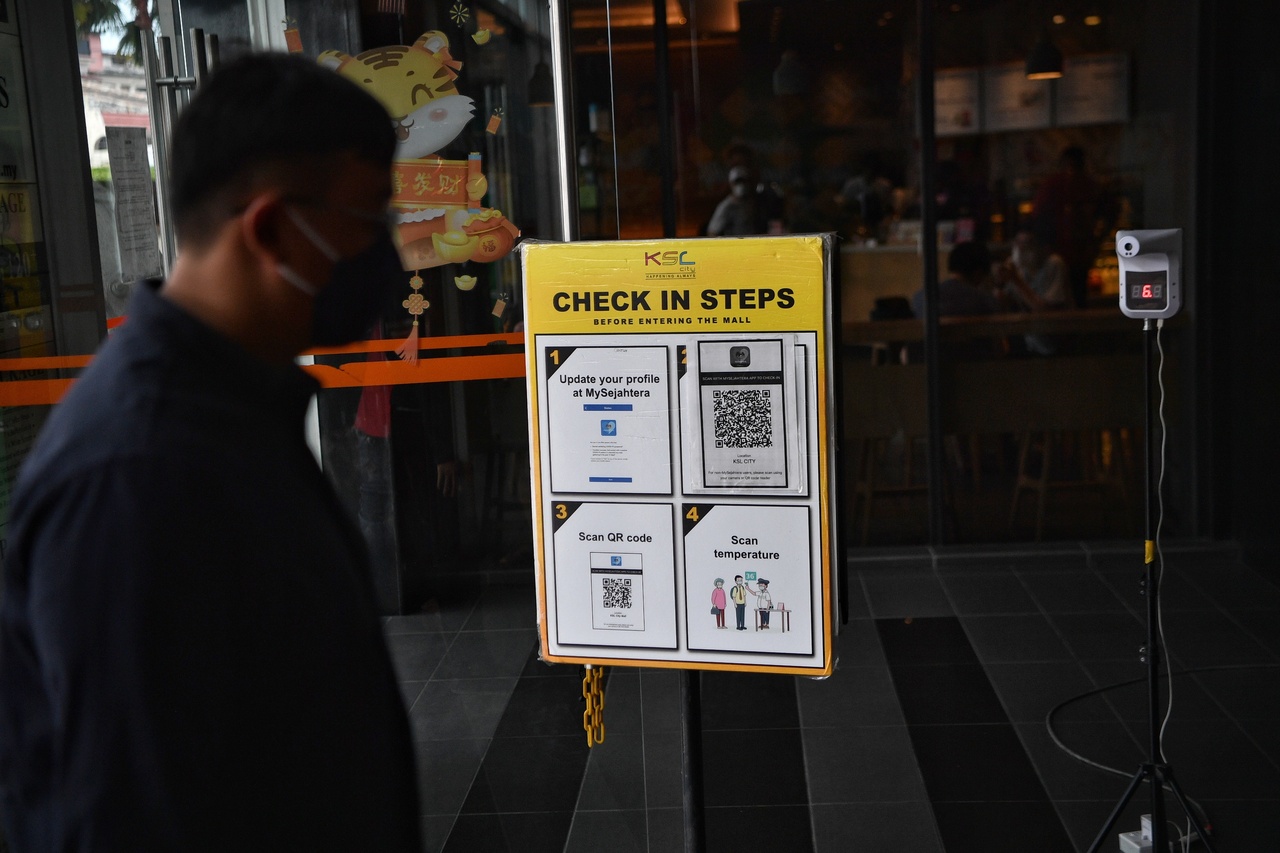Sharp drop in usage of Malaysia's contact tracing app as apathy sets in
Sign up now: Get insights on the biggest stories in Malaysia

A sign for Malaysian check-in app MySejahtera at the KSL City Mall entrance in Johor Baru, Malaysia, on April 17, 2022.
ST PHOTO: ARIFFIN JAMAR
KUALA LUMPUR - Fewer Malaysians have been using their MySejahtera Covid-19 contact tracing app in the last few weeks to enter business premises, although the government will drop the check-in requirement only from Sunday (May 1).
Experts believe the sharp drop in people scanning the QR code of the MySejahtera app - akin to Singapore's TraceTogether - is caused by apathy and the view that the coronavirus is no longer a threat to public health.
According to data provided by Malaysia's Health Ministry, the average daily check-ins at registered premises using the app fell 30.3 per cent, or by 7.4 million, over the two weeks from March 25 to April 9.
Malaysia transitioned into the endemic phase of living with the virus from April 1, but still required people to use the MySejahtera app before entering malls, shops and offices.
There is a stiff fine for those who flout this rule.
From early 2020, the use of the app for all businesses nationwide was made compulsory to help the health ministry detect those exposed to Covid-19 carriers, so that they could be warned and possibly isolated to protect others from the virus.
Under the Prevention and Control of Infectious Diseases Act, those who flout the rule on checking in with the app could face a maximum fine of RM1,000 (S$315), while businesses can be fined RM10,000.
Health Minister Khairy Jamaluddin said on Wednesday (April 27) that it will no longer be compulsory to scan the MySejahtera QR code when entering premises from Sunday.
But he advised Malaysians to activate the app's Trace function for contract tracing purposes.
One person who had stopped using his MySejahtera app is tutor Josiah Ng.
"It's very annoying to have to flip out your phone and scan the QR code at the entrance before being allowed into a mall. There would be a long queue because of it when it should have just taken seconds (to walk in)," said the 29-year-old who stopped using the app last month.
"What's the point, we're going to live with Covid-19 anyway," he said.
Echoing the same sentiment, promoter Natasha Ibrahim said lack of enforcement has led her to abandoning the app.
"No matter how much I try to follow the rules, it's just very tiring. Plus, the latest Covid-19 strain is not as bad as it was before and the lack of enforcement doesn't help," said 25-year-old sales promoter at a shopping mall.
Worrying that apathy has set in, Professor Awang Bulgiba Awang Mahmud, chairman of the Covid-19 Epidemiological Analysis and Strategies Task Force, told The Straits Times: "There has been so much hype about it being an endemic disease, without really understanding what it means to consider it one."
He said a second possible reason is that "there is little enforcement of QR code scanning now so premises probably think they can get away with people not scanning.
A third possible reason, he said, is the ongoing court case involving the companies involved with MySejahtera. "This has apparently led to calls for people not to use the app, due to fears about their data being used for purposes other than health," he said.
The app was recently embroiled in controversy after the government's Public Accounts Committee questioned the lack of a formal contract inked between the government and the developer, raising public concerns on the safety and ownership of users' personal data.
The growing resistance towards the use of the app could lead to poor situational awareness of Covid-19 on the part of the health ministry and poorer management of the situation, said Datuk Awang.
But responding to the latest announcement by the government, he said: "Most of the current cases are unlinked now so I think contact tracing is no longer a priority. I suppose this would be a valid point to drop the check-in requirement."
Government data showed that 81.5 per cent of the Malaysian population is fully vaccinated. Conversely, this would mean that 18.5 per cent of the total of 33 million population is not vaccinated or only partially vaccinated.
Of those fully vaccinated, 49.1 per cent have received booster shots.


